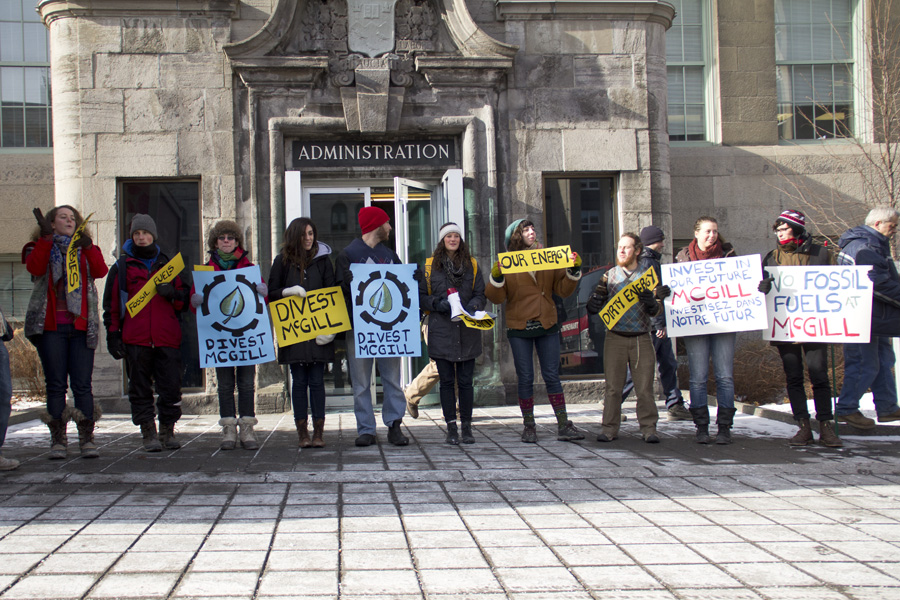On Friday afternoon, Divest McGill delivered two petitions to the university’s Secretary-General, Stephen Strople, calling for McGill to divest from the Plan Nord, the oil sands, and fossil fuel industries.
According to administrative practice, the petitions will be passed on to the Committee to Advise on Matters of Social Responsibility (CAMSR)—an advisory body responsible to the Board of Governors (BoG)—where they will eventually be reviewed.
Launched in October 2012, Divest McGill is a student-led campaign concerned with environmental issues such as climate change and McGill’s investments in companies whose projects negatively affect the environment. It circulated the two petitions over the past three months, and garnered a total of 750 signatures from students, faculty, staff, and alumni.
The first petition calls for Mc- Gill’s Investment Committee to “dispose, in an orderly and responsible fashion in no longer than three years, of the University’s holdings in corporations which produce, refine, transport, or sell fossil fuels,” and to also divest from financial institutions that support fossil fuel companies within three years.
The second petition requests that the university divest from corporations linked to the Quebec government’s Plan Nord—a development project to extract natural resources in the north of the province. This petition also calls for McGill to cease its relationship with “corporations that do business on native land against the wishes of the native peoples of that land.”
“Tar sands and fossil fuels are already … buzzword[s] in Canada …. This is an issue that affects all of us personally in a variety of ways,” Lily Schwarzbaum, U3 arts, said. “At the same time that we independently … decided to make our own campaign, there were actually campaigns going on all over North America, organized by 350.org in the States, and the Canadian Youth Climate Coalition in Canada, to divest from the fossil fuel industry.”
“McGill University, as a top academic institution in Canada, has a major social role to play in … challenging the way that the fossil fuel industry has engrained itself in Canadian society,” Schwarzbaum continued.
Schwarzbaum and U3 arts student Christopher Bangs, who are both spokespersons for Divest Mc- Gill, expressed satisfaction with the amount of support that the campaign has received since its initiation.
“We’ve had endorsements from SSMU, endorsements from the AUS, and we’re bringing it forward to other student associations, labour unions, and faculty associations,” Bangs said. “It seems like everyone we talk to [and] everyone we try to collect signatures from is really, really into it.”
About 20 students gathered in front of the James Administration Building on Friday to watch Divest McGill members deliver the two petitions to Strople. The event included several chants, as well as speeches to the crowd.
“Climate change is one of the greatest threats of our generation,” Bronwen Tucker, U2 environment, said. “It is our obligation as a university and as a community to act and ensure a sustainable … future for our planet.”
“McGill is one of the only universities in North America to have a formal process for [expressing] concerns about the impact of university investments,” Tucker continued. “We commend McGill for this open channel. We believe it demonstrates a concrete commitment to ethics and the free exchange of ideas.”
Strople will be handing over the two petitions to CAMSR.
“We will proceed under the Terms of Reference of CAMSR [as outlined in the BoG Handbook] to review it and … move forward,” Strople said.
Bangs said he is optimistic about CAMSR’s review process, which includes analyzing the substance of—and concerns raised in— the two petitions.
“Secretary-General Strople informed us that we can probably expect a … response [within] two weeks,” he said.
Following its review, if CAMSR confirms whether “social injury”—as defined in Section 5 of CAMSR’s Terms of Reference—has occurred, the Committee will recommend to the BoG whether action is necessary, and what form such action should take, a process which is expected to take several months.
“We’re sort of expecting a decision by October,” Bangs said.
Bangs and Schwarzbaum were also pleased with the energy exhibited by participants during Friday’s presentation, and expressed enthusiasm for the expansion of the Divest McGill campaign.
“I see a lot of potential for the community at McGill to get involved because there [are] so many ways of looking at it—from an environmental standpoint, from an economic standpoint, from a community- building, academic mission standpoint,” Schwarzbaum said. “We’re very excited to be able … to use the resources that we have to work for our future.”









Pingback: Highlights from the Feb. 7 SSMU Council - McGill Tribune